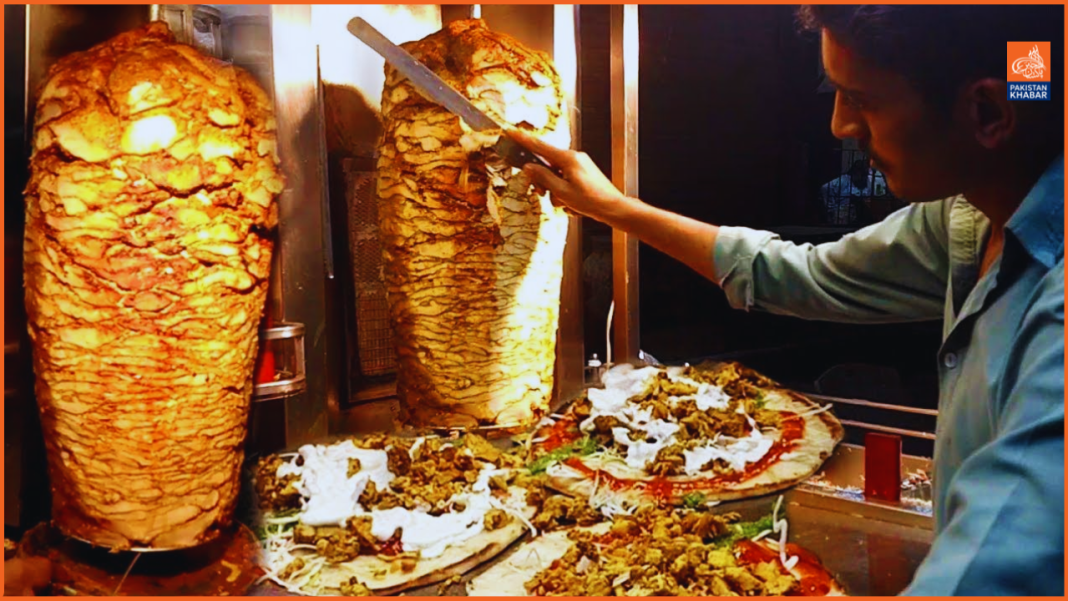The excessive consumption of unhealthy food among teenagers and young adults across Pakistan is taking a toll on their health, leading to serious conditions such as obesity, piles, allergies, and digestive disorders.
In Khyber-Pakhtunkhwa (K-P), like other parts of the country, the rampant availability of junk and expired food items—like burgers, shawarmas, chicken rolls, and chips—has resulted in an increase in hospital visits. Many youths find themselves in doctors’ clinics due to stomach issues caused by these substandard foods.
Faraz Khan, a 24-year-old from Wapda Town, Nowshera, recently experienced severe stomach pain linked to irritable bowel syndrome and piles. After being rushed to a government hospital in Pabbi, doctors diagnosed that the expired chicken used in items like shawarmas and chicken rolls, along with fatty, high-carb foods and sugary beverages, were the culprits behind his condition.
Unfortunately, Faraz’s story isn’t unique. Thousands of students across K-P are regularly exposed to unhealthy junk food, sold openly outside schools and colleges. Areas like Qissa Khwani bazaar, Namak Mandi, Faqirabad, and others are packed with food stalls offering unsafe and often expired meals.
Professor Dr. Ata Muhammad from Lady Reading Hospital in Peshawar explained that Pakistan, like many countries, faces a growing obesity crisis, particularly among students who regularly consume unhygienic, low-quality food. He pointed out that globally, obesity ranks as the fifth leading cause of death, contributing to around 60-70% of fatalities linked to non-communicable diseases like diabetes, heart disease, and cancer.
According to a World Health Organization (WHO) report, the number of children and teens aged 5 to 19 with obesity has skyrocketed from 11 million in 1975 to 124 million in 2016. Pakistan ranks 10th globally in obesity rates, with nearly 50% of its population considered overweight or obese, according to the World Obesity Foundation.
Dr. Ata warned that if no action is taken to regulate the sale and production of unhealthy food, around 5.4 million schoolchildren in Pakistan could be obese by 2030.
Dr. Naeem Khattak, an economist at the University of Peshawar, attributed the rising trend of junk food consumption to aggressive marketing on social media, which draws young people—who make up almost half of the population—towards unhealthy eating habits.
Dr. Sirzamin Khan, Head of the Urology Department at Government Hospital Pabbi, also highlighted the concerning data from various hospitals, showing that 40-50% of children in K-P are either overweight or obese. He emphasized that policymakers and the K-P Healthcare Commission need to act swiftly to curb this trend. He also noted that lack of parental supervision, the unchecked promotion of unhealthy food on social media, and limited access to sports activities have further contributed to the problem.
Doctors recommend a healthier approach—balanced, home-cooked meals, regular exercise, and sports—to prevent obesity and related health issues. At the same time, there is a call for stricter regulations on food safety and standards.
The Khyber-Pakhtunkhwa Food Safety and Halal Food Authority (KPFS&HFA) spokesperson confirmed that the government has ramped up its crackdown on sellers of unsafe and substandard food. Last year alone, the authority conducted over 136,690 inspections and destroyed nearly 540,000 kilograms and liters of substandard food items.
In addition, thousands of liters of counterfeit beverages and adulterated milk were discarded. The government has pledged zero tolerance for those involved in the sale of unsafe food. Mobile food testing labs with advanced equipment have been set up in major divisional headquarters, and plans are underway to establish similar labs at the district level. These mobile labs test various food products, including milk, flour, oil, ghee, and water, ensuring food safety standards are met.
The KP Food Safety Authority, established under the 2014 act, also enlists volunteers alongside its staff to help monitor and enforce food safety and quality standards.




